Here is an in-depth look at the Velojuicer, our pedal-powered apple juicer. A lightweight, mobile, all-in-one machine that scrats, presses, and juices apples using only human power and a bit of good humour.
The Velojuicer is a brand new invention for making juice at community apple days. It is a new improved version of the traditional scratter and press and is great fun to use, produces a large amount of juice in double quick time, and is a great spectacle and centrepiece for community apple days. It is designed to be used by adults and children alike, is 100% human powered and off-grid so can be used in any setting, and also converts into a bike trailer so it can be towed around the city to different events.
Fergus Walker, our Glasgow project manager here at the Orchard Project, set out to create a new improved juicing machine to make use of the abundant harvest. With so many community orchards being planted, we are soon going to have a lot of surplus apples, especially on bumper crop years like 2018 in Scotland. And juicing is a good way of preserving and being able to make use of that harvest – especially when the increasingly wild storms of climate change are likely to knock all the apples and pears off in one go. But there isn’t currently anywhere in here Glasgow that lends or hires juicing equipment. Fergus teamed up with designer and maker Uula Jero and after a lot of thinking, designing and processing the Velojuicer is now ready to greet the world. Here is their story.
What we set out to create is no ordinary piece of equipment. We wanted something that would stand out from the crowd. We have previously developed various pedal powered contraptions that have run at many events across Scotland and beyond and what we have seen with all these contraptions is that people are captivated and inspired by human powered mechanical processing, particularly of foodstuffs. There is a delight in being able to use the power of your body to instantly transform grain into flour, or fruits into smoothies that gives people a new insight into questions of where food comes from, how it is produced and how we as a society are generally pretty removed from our food system.
However, despite the downsides, there are lots of clever innovations from industry that have made the processing of food efficient, safe and easy. These can be seen in fruit juicing equipment once you step up from the hobby scale to the commercial scale. The small hand-powered scratter and press that most community orchards have access to are great fun for demonstrating the principle of juicing, but if you have ever used them to try to extract more than a few taster glasses, you will know that the initial challenge soon becomes a hard slog as you wrestle with the screw press, chop the apples and turn the scratter handle. However, if you get your hands on the more efficient commercial scale equipment, you can produce a lot of juice with great ease. See Vigo presses comparison of juice extraction rates here. However, this type of commercial equipment is often not suitable for apple days – it is heavy, you usually need access to mains water or electricity, and you need a lot of cash to purchase it. We wanted to make that quality mobile and available for community apple days.

“I was inspired by a machine TOP has in Manchester, says Fergus, “It’s called ‘Pedal Pedal Squish Squish’ and was developed by Dan our Manchester project manager – (pictured). Our new design takes the best elements of this contraption and takes it to the next level.”
Our vision is that by providing common access to pressing equipment that provides a commercial standard of pressing using human power, people will be inspired by the experience and will become more involved in making use of orchard fruit in the city, helping to grow the orchard movement.
This machine was partly made possible by the generous donation of a scratter from Vigo Presses. The press is a 20 litre Speidel Hydropress. We hope to be able to develop this machine further so that it is available for use by community groups. If you are interested to find out more about the machine, get in touch with Fergus [email protected] (our Glasgow project manager).

For the design geeks out there here’s the original specifications for the machine:
Function
The equipment will be designed around a Speidel Hydraulic Press for maximum juice yield and a scratter that can supply pressing at a suitable rate for the press. It is proposed that this is a Vigo stainless steel electric scratter converted to run on pedal power, as this will negate the need to chop the fruit prior to scratting (as is required with the hand scratter).
The equipment will be easily transportable by bike or van. It is proposed that scratter and press are mounted on a trailer and this is mounted with press-fit removable wheelchair wheels allowing the trailers to be quickly converted to stable platforms sitting on the ground.
The trailers will make reasonable provision for the transport and use of associated paraphernalia of pressing, including containers for washing and water transport, bottling equipment, etc.
User requirements
The equipment must be a stable working platform such that it doesn’t wobble when effort is applied (pedal power, working the press). There needs to be provision for people of all sizes (from age 5 up) to be able to have a go at operating the scratter pedals or press arm), working at an ergonomic height where possible. The scratter needs to be able to be operated effectively by human power. It is ideal for the pedal operator to be able to face the work.
Dimensions & weights
The equipment will be compact and light enough to be able to be pulled by bicycle(s) and fit into a medium transit van.
Health and safety requirements
The equipment must be stable enough not to tip over during use, while being pulled by bike, or any conversion or adjustment between these modes.
Equipment will be designed to minimise risk of accidental injury.
Any materials that come into contact with foodstuffs must be food-grade.
Cleaning must be easily done at the end of the day.
Materials & construction
Materials must be durable enough to withstand corrosion by acid fruit juice and outdoor use.
Construction and materials must be durable enough to withstand the use and abuse of a community apple pressing (e.g. parts not working loose during the day).


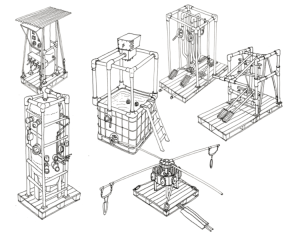

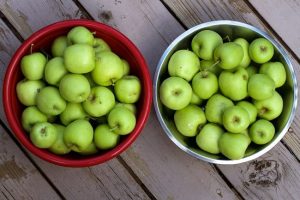
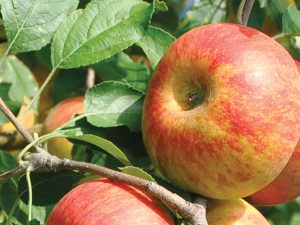
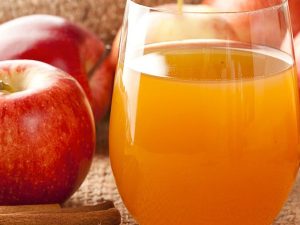
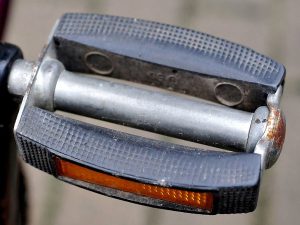
1 Comment
Looks a fantastic idea! To my mind the more “human powered” items of machinery able to do simple tasks and do them well is extrmely important in this day and age – anything that reduces powered (by non human means e.g petroleum driven machines of a size such as this) has got to be apple-ed (cheap pun?).
Just one thing worries me and that it the “guarding” of various mechanical gearings etc including shoving a small arm down the loading tube – it is designed to be used by young children, hopefully supervised but as we know young children no matter what they are told think they can and want to do the job on their own – something jams and in a panic the arm goes down the tube to free the jam (if mum finds out I’ve been using this on my own I’m in trouble). somebody cranks the peddle and exit a couple of fingers – if adults can do it I’m sure young children will have a go to – if it does happen (I hope it never does) the HSE will be unrelenting on the closure of the entire works – they may even inspect it before use and that will be one of the questions asked.
Having said that I wish you all the luck in the world with the production of “the beast”
the Walrus